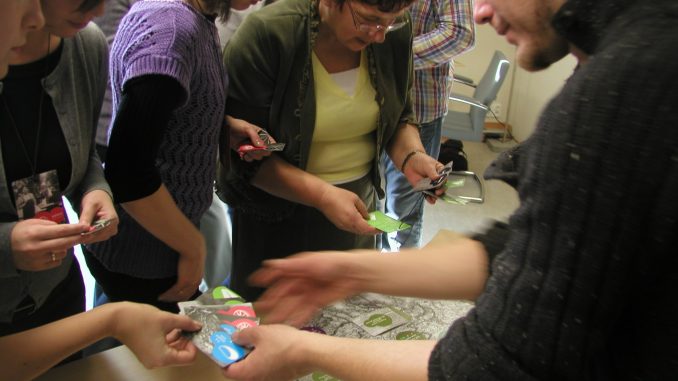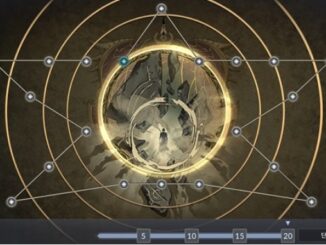
Educators (and indeed most other people) seem to be quite happy with the idea that children, and other young animals, learn from play. Felines learn hunting skills by being given food to play with by their parents. Baby bears learn to defend themselves by play-fighting with siblings. A multi-million dollar industry is supported by the idea that human babies perfect motor skills using Baby Gyms and Activity Centres.
But as we grow and mature, it becomes less ‘acceptable’ to spend time ‘playing’. We are expected to ‘take things seriously’. And, as many of us who work in organisational learning settings know, it can be extremely hard, sometimes, to sell in the idea that games can be ‘serious’ and can facilitate learning in mission-critical areas like Strategy, Leadership and Change.
And yet what could be more ‘serious’ or mission-critical than learning to walk, or speak (or hunt food, or fight)? What is it that leads many to accept that something is a (potentially the) most effective way of learning for an organism, but suddenly – simply because that same organism has aged, becomes not only ineffective, but something viewed with disdain – characterised as ‘wasting time playing with children’s toys’ or similar?

‘Play’ comes to be seen as the polar opposite of ‘work’ – and along with that comes the idea that each can be done, but at specific, and different times. This implies that many of the characteristics of ‘work’ cannot be shared with play. Work doesn’t need to be, or maybe even shouldn’t be, ‘fun’. Work is something we are compelled to do. Play is what we choose. Work is acting under instruction or some other external influence. Play is self-directed (a consequence of choosing to do it). The logical extension of those beliefs when applied to workplace learning, is that learning should be like our work – that is, an obligation that is not fun, and that what and how we learn is prescribed by someone else.
In contrast to these (somewhat depressing) beliefs, if anything, there is a case to be made that games are even better at facilitating learning in adults than they are for children – games being more structured than the ‘play’ through which young children learn – but that is the subject of a whole different article.
Knowles principles and assumptions of Andragogy are widely used when designing learning for adults, as opposed to Pedagogy – learning for children.
Much of Knowles work is concerned with adults’ motivation to learn. Indeed, his theory of adult learning can be stated in terms of six assumptions relating directly to engagement and motivation.
- Adults need to know the reason for learning something.
- The learning needs to have immediate relevance to their work or personal lives.
- Adults respond better to internal rather than external motivators.
- Adults require autonomy in their learning, needing to be responsible for their own decisions, including in planning and evaluation of learning.
- Experience, including errors should be the basis of learning activity.
- Learning is problem-centred rather than content-centred.
Of these, the last three are particularly well satisfied by learning which is based in games or play. Games, other than games of pure chance, are engines which allow players to progress autonomously through a decision -> action -> feedback loop. Games are mechanisms for creating experiences, and those experiences focus on solving a problem (to reach the next ‘win-state’) to progress.
A really important point made in “The Art of Game Design – A Book of Lenses” by Jesse Schell, is that the ultimate goal of a games designer is not to create games but to use games to create experiences.
This means that the disciplines of games design and learning design for adults are extremely congruent in their aims. The experiences which the learning game designer must create should bring about a change in knowledge, skill or attitude (a simple but sufficient definition of learning).
Games, simulations and other kinds of playful design, are, fundamentally structures made of ‘mechanics’, rules or even mathematical models. But games with very similar structures can offer very different experiences, because those structures can easily be ‘dressed’ in different ‘aesthetics’ and themes and stories. As an example, Cluedo (Clue in the US and elsewhere) is a hidden information game, and so is Battleships, but one is ‘about’ a murder in a stately home, and the other, naval warfare.
This ability to attach story, theme and purpose, to an underlying structure helps us to satisfy the first three assumptions in the list above, and also (if well designed) can be a large part of what makes playing ‘fun’ – a great motivator to continue to play.
So, if as learning designers, or clients of learning designers, we are happy to accept that Knowles gives us appropriate guidance in how to design effective learning for adults, we should also be happy that games provide us with one very effective route to do that. This should be regardless of how ‘serious’ the application.

As mentioned above, it is sometimes difficult to convince a client that activities, which may elicit ‘fun’, can, in any way, be compatible with what they want to achieve in a ‘work’ setting, but this shows a misunderstanding of what ‘fun’ is. It is not necessarily trivial, because it is not a homogenised experience. Playing ‘Minecraft’ can be fun, but so can walking a tightrope across Niagara Falls (for some people), and the second is definitely serious, deadly serious, in fact. It is true that neither of these kinds of fun would be encouraged in most workplaces, but there is plenty of fun that could be; forming fulfilling professional relationships; working towards solving a knotty problem, finally solving it, exercising creativity, being delightfully surprised by learning something.
Looked at this way, disregarding a method to facilitate learning because people might enjoy it too much, not only wastes the opportunity to highly motivate learners, but also makes you look like a bit of a killjoy.
- James Bore – The Ransomeware Game - 13th February 2024
- Ipsodeckso – Risky Business - 23rd January 2024
- Review – Luma World Games - 15th December 2023





Be the first to comment